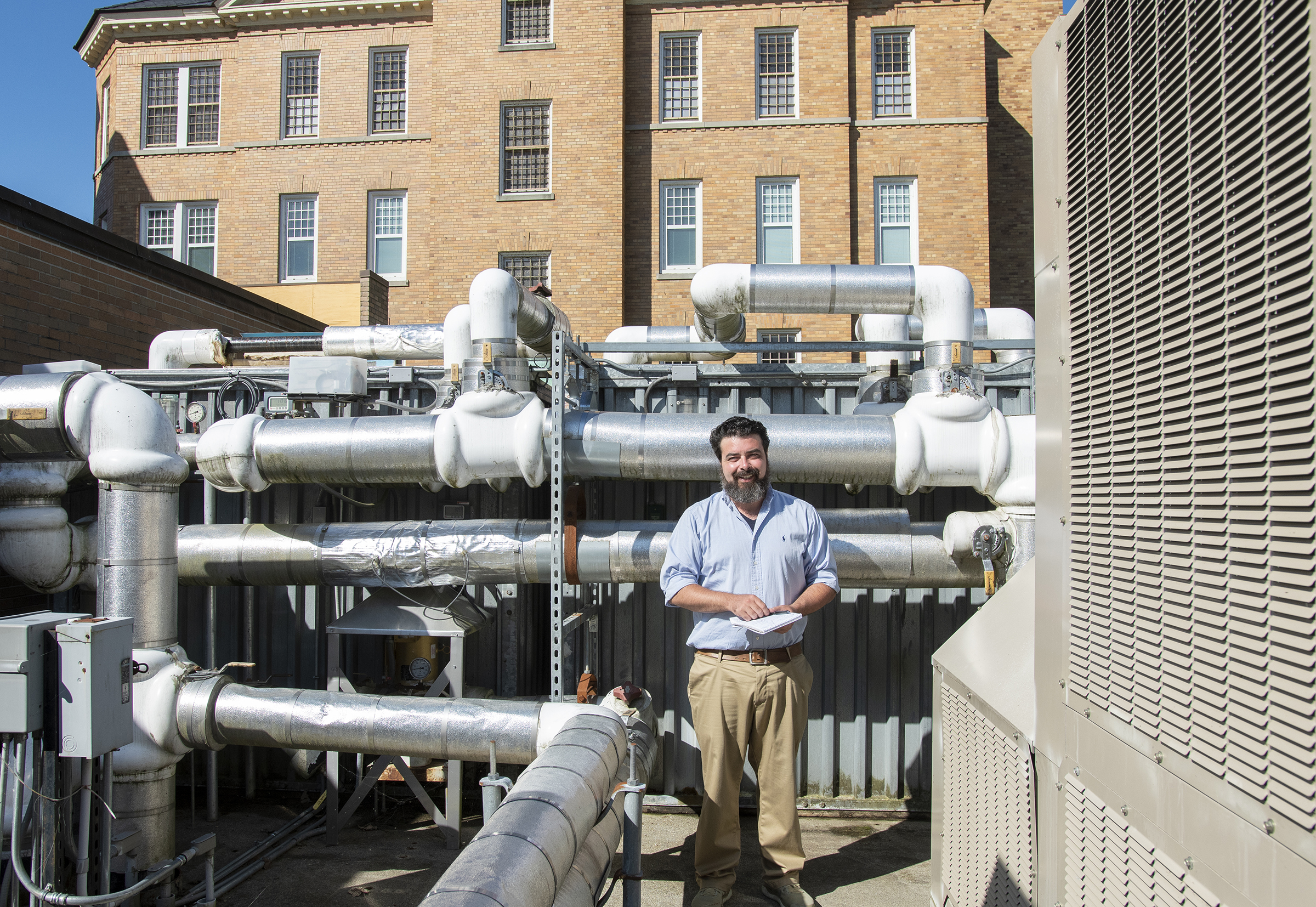Dynamic Organics Innovating Energy Storage for a Cleaner, Greener Electric Grid
Remember Tuesday, July 30 a few months back? It was the hottest day of a record-breaking month – the warmest recorded in the history of the earth. It was also a day when thousands of Vermonters cranked up their air conditioning, resulting in what power companies refer to as “peak demand” for electricity. On that day, and many others throughout the summer, New England’s century-old electric grid kicked into overdrive, tapping reserve generators to meet the spike in demand. While that system worked to keep homes and offices cool, the problem it creates is twofold, says Morgan Casella, co-founder of Dynamic Organics.
First, electricity used during peak hours is expensive to produce, and rates are set for customers based on averages over time, so the higher the “peak,” the higher rates will be over time.
Second, the reserve generators, known as “peaker plants,” rely largely on oil and coal – sources of energy that can be easily stored and accessed on demand. So, in addition to driving up rates for consumers, the energy being generated to cool homes is emitting carbon into the atmosphere, a known contributor to global climate change.
“Electricity is seen as part of the solution to fossil fuels,” said Casella. “You can make it from the sun, the wind, hydropower, or heat from the earth, but we don’t yet have the technology to hold that clean energy in reserve for periods of high demand, so we end up relying on fossil fuels.”
With a new report from the U.S. Department of Energy projecting increases in U.S. electricity consumption by as much as 40 percent by 2050, Casella and co-founder Andy Klaski are looking for innovative ways to build a greener grid. “People see electric cars, for example, as friendlier to the environment,” he said. “But we need an infrastructure that can support energy from renewables. It’s essentially a storage problem.”
The key to a cleaner, greener electric grid, according to Casella, is flexible load management, or the ability to maximize the use of energy from renewable sources when it’s available and minimize tapping the grid during periods of peak demand. “It’s a shift in how we think about energy,” said Casella. “Until now, we have generated electricity based on demand, or load. Flexible load management flips that assumption and looks for ways to use energy when it’s readily available and affordable.”

Rebecca Foster, director of Efficiency Vermont agrees. “The new goals for those of us working in the energy sector are to reduce both carbon and costs,” said Foster. “As renewable electricity continues to increase, not just how but when we use electricity matters. By increasing the number of control businesses and homeowners have over when they use electricity, as a state, we can maximize our consumption of renewable electricity and avoid relying on polluting and expensive fossil fuel generators.”
Buildings As Batteries
Casella’s idea is to use the state’s biggest buildings as giant batteries. Working with Efficiency Vermont and utilities including Green Mountain Power, Dynamic Organics is finding innovative ways to store renewable energy in large commercial buildings, and decrease load on the grid during peak times.
One of their earliest success stories is at the Brattleboro Retreat, a not-for-profit regional mental health and addiction treatment center in Brattleboro, Vermont. A review by Efficiency Vermont in 2014 discovered three shipping container-like boxes behind the Retreat’s campus that connected to an electric chiller unit. A legacy system from the 1990s, the system could provide chilled liquid to the Retreat buildings and also make and store large amounts of ice. “The most obvious option to cut the electric bill was to turn the ice-maker off,” said Casella, “but we were intrigued by its ability to store thermal energy in the form of ice.”
Together with Efficiency Vermont and Green Mountain Power, the team began to explore how this giant battery, already connected to the electric grid, could be used not only to reduce energy costs for the Retreat, but also to save Green Mountain Power customers money while reducing carbon emissions. They discovered that the system was making enough ice to delay the use of 3.2 megawatt-hours of electricity, but the ice was not being used to cool the buildings. In fact, most of it was melting.
Dynamic Organics developed a custom controller and software that allows for remote and automated control of the system, and used sophisticated forecasting models to determine the best times to make ice, and the best times to draw on it to cool the buildings. “In a nutshell, we created big blocks of ice during the night, then turned the AC off during the day… and it worked.” The Retreat reduced its peak energy demand by more than 115 kilowatts, saving an estimated $13,500 just by shifting the timing of their energy use to off-peak.
Scaling a Business
Recognizing that the Retreat was a case study of exactly one, Dynamic Organics began to think about how this model of success might be replicated elsewhere.
“At the time, we were consultants on energy design,” said Casella, “but after the Retreat experience, we saw an opportunity to develop a software solution that would enable utilities to facilitate shifts to flexible load management among their largest customers. It made more sense than trying to tackle the problem building by building.”
This substantial shift in the company’s business model, however, did not come without challenges. “All of a sudden we were in start-up mode again,” said Casella. The company was chosen to participate in a business accelerator managed by the Vermont Sustainable Jobs Fund for climate economy entrepreneurs, where they began to explore their market opportunity in earnest. “We received feedback from more than 40 mentors during the three-month program,” said Casella, “not to mention meetings with companies in Vermont that were interested in our services. With that input, we were able to make the leap from consulting with individual customers to being part of a much broader, supervisory role in partnership with utilities.”

Realizing their position within the broader marketplace, Dynamic Organics is currently working with Green Mountain Power on software platforms and building-level hardware that will help manage and automate flexible load management.
“The ultimate vision here is to put more renewables onto the grid,” said Casella. “As we transition from fossil fuels to electrifying everything, moving big chunks of energy consumption to off-peak is good for consumers and good for the planet, and we’re at a point in time where we need to catalyze change quickly. Vermont has a real opportunity to lead a paradigm shift in how we manage energy.”
Lead photo caption: Morgan Casella of Dynamic Organics is finding innovative ways to store renewable energy in large commercial buildings, and decrease the load on the grid during peak times. Casella’s idea is to use the state’s biggest buildings, including the Brattleboro Retreat, as giant batteries. Photo by Erica Houskeeper.
About DeltaClimeVT
Managed by the Vermont Sustainable Jobs Fund, DeltaClimeVT is a business accelerator program that supports entrepreneurs committed to climate economy innovation. Open to startups and seed stage ventures from Vermont, the U.S., and Canada, participants are guided through the world-class accelerator curriculum, designed to test assumptions, expose and remediate business vulnerabilities, prepare for significant investment, and provide a platform for rapid scale. For more information, visit deltaclimevt.com or contact Geoff Robertson at 802-828-3753.

